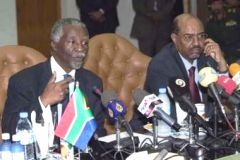Sudan’s Bashir takes tough line on UN troops
June 20, 2006 (KHARTOUM) — Sudan told visiting South African President Thabo Mbeki on Tuesday that it was out of the question for U.N. troops to deploy in the troubled Darfur region of western Sudan to replace an African Union (AU) force there.
 Sudanese President Omar Hassan al-Bashir told a joint news conference with Mbeki that U.N. forces were unacceptable because they would come to Sudan with colonial and imperial ambitions.
Sudanese President Omar Hassan al-Bashir told a joint news conference with Mbeki that U.N. forces were unacceptable because they would come to Sudan with colonial and imperial ambitions.
The United States and the United Nations have been pressing for the U.N. force, arguing that the existing AU force of 7,000 does not have the resources to end three years of conflict in Darfur, where more than two million have fled their homes.
The Sudanese government has resisted all attempts at persuasion and Bashir stuck to his position on Tuesday.
“We do not reject the United Nations, but in no way will we accept U.N. troops because … these troops have an imperial and colonial agenda. Changing this mission to the United Nations will never happen, never ever happen,” he said.
Mbeki told the news conference that South Africa was interested to see the United Nations assist in a way agreed by the government of Sudan and the African Union. “But we did not come here to discuss that issue,” h% added.
Mbeki, on a one-day visit to Khartoum, had been expected to keep up the pressure on Khartoum to approve the U.N. mission.
But Bashir had already signaled his intention on Monday evening, when he told Sudanese members of parliament that he would not let U.N. troops deploy as long as he was in power.
“President Bashir pledged himself to lead the resistance against any U.N. military intervention if it happened in Darfur,” the state news agency SUNA quoted him as saying.
CHAPTER 7
A senior African official said that in private the Sudanese government was taking a softer line, indicating it could accept a U.N. force which does not derive its mandate from Chapter 7 of the U.N. Charter, which authorizes the use of force.
The United Nations cites Chapter 7 for aspects of nearly all peacekeeping mandates for protecting civilians or self-defense.
The African Union’s top diplomat, Alpha Oumar Konare, visited Darfur on Tuesday and said nothing could be done without the consent of the Sudanese government.
“Nobody can impose anything on Sudan,” he told reporters in El Fasher, the capital of North Darfur province. “This matter will be addressed in discussions to see how best the Abuja deal (on peace in Darfur) can be implemented.”
Konare told provincial governor Youssef Kibir that it was important to explain the May 5 peace deal to the people, many of whom are skeptical or hostile to the agreement.
“Even though the conflict has been long, I still am optimistic that peace is at our door,” he told Kibir.
“The Abuja deal is a step forward and is a good compromise, acceptable to all those who want peace,” he added.
Thousands in Darfur’s refugee camps have demonstrated daily against the accord, saying it does not meet their basic demands. AU forces have been attacked by angry Darfuris.
The conflict in Darfur began in 2003 when Darfur rebels rooted in non-Arab farming communities took up arms to demand better representation in government. The government recruited tribal Arab militias in an attempt to defeat the rebellion.
(Reuters)
